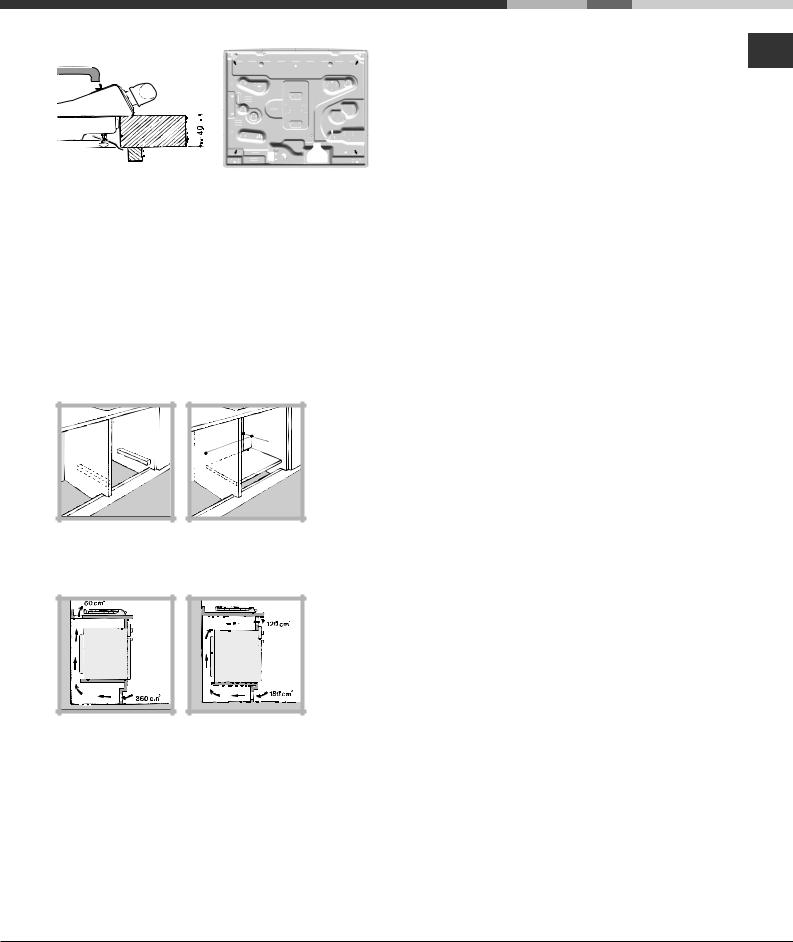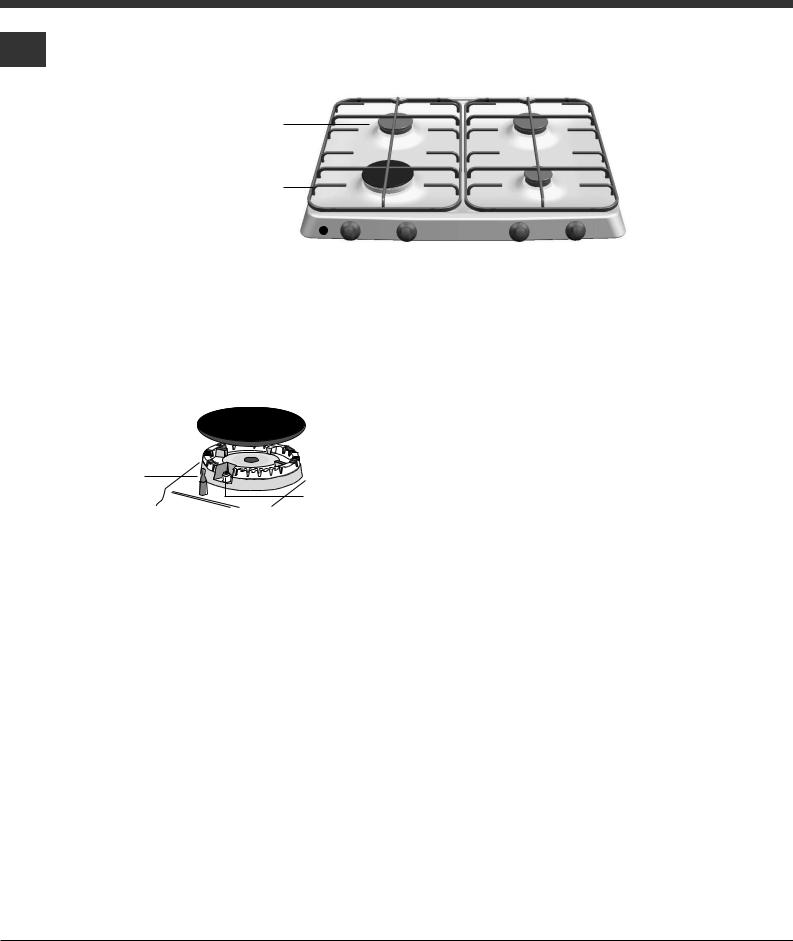ARISTON CISPF 640 E IX-HA, 7HPF 640 S RU-HA, 7HPF 640 E IX RU-HA, 7HPF 640 E RU-HA, 7HPF 640 ES IX RU-HA User Manual [ru]
...
Operating Instructions
HOB
|
|
|
|
|
|
|
|
|
|
|
|
Contents |
|
|
|
|
|
|
GB |
|
|
|
|
|
|
|
|
|
|
|
|
|
Installation, 2-5 |
|
|
GB |
|
|
|
||
|
|
RS |
|
|
||
|
|
|
Positioning |
|||
|
|
|
|
|
Electrical connection |
|
|
|
|
|
|
||
English, 1 |
,11 |
Gas connection |
||||
|
|
|
|
|
Data plate |
|
|
|
|
|
|
Burner and nozzle specifications |
|
|
|
|
|
|
Description of the appliance, 6 |
|
|
|
|
|
|
Overall view |
|
|
|
|
|
|
Start-up and use, 7 |
|
|
|
|
|
|
Practical advice on using the burners |
|
|
|
|
|
|
Practical advice on using the electric hotplates |
|
CISPF 640 E IX/HA 7HPF 640 S RU/HA 7HPF 640 E IX RU/HA 7HPF 640 E RU/HA 7HPF 640 ES IX RU/HA 7HPF 640 ES RU/HA
Precautions and tips, 8
General safety Disposal
Maintenance and care, 9
Switching the appliance off Cleaning the appliance Gas tap maintenance
Troubleshooting, 10

Installation
! Before operating your new appliance please read this GB instruction booklet carefully. It contains important information
for safe use, installation and care of the appliance.
! Please keep these operating instructions for future reference. Pass them on to possible new owners of the appliance.
Positioning
!Keep packaging material out of the reach of children. It can become a choking or suffocation hazard (see Precautions and tips).
!The appliance must be installed by a qualified professional according to the instructions provided. Incorrect installation may cause harm to people and animals or may damage property.
!This unit may be installed and used only in permanently ventilated rooms in accordance with British Standard Codes Of Practice: B.S. 6172 / B.S. 5440, Par. 2 and B.S. 6891 Current Editions. The following requirements must be observed:
•The room must be equipped with an air extraction system that expels any combustion fumes. This may consist of a hood or an electric fan that automatically starts each time the appliance is switched on.
|
|
|
|
|
|
|
|
|
|
|
|
|
|
|
|
|
|
|
|
|
|
|
|
|
|
|
|
|
|
|
|
|
|
|
|
|
|
|
|
|
|
|
|
|
|
|
|
|
|
|
|
|
|
|
|
|
|
|
|
|
|
|
|
|
|
|
|
|
|
|
|
|
|
|
|
|
|
|
|
|
|
|
|
|
|
|
|
|
|
|
|
|
|
|
|
|
|
|
|
|
|
|
|
|
|
|
|
|
|
|
|
|
|
|
|
|
|
|
|
|
|
|
|
|
|
In a chimney stack or branched flue. |
Directly to |
|
|
|
|
|||||||||||||||
(exclusively for cooking appliances) |
the Outside |
|
|
|
|
|||||||||||||||
|
|
|
|
|
|
|
|
|
|
|
|
|
|
|
|
|
|
|
|
|
•The room must also allow proper air circulation, as air is needed for combustion to occur normally. The flow of air
must not be less than 2 m3/h per kW of installed power. The air circulation system may
take air directly from the outside
by means of a pipe with an inner
cross section of at least 100 cm2; the opening must not be vulnerable to any type of blockages.
Adjacent |
Room to be |
Room |
Vented |
Enlarging the ventilation slot |
|
between window and floor. |
|
The system can also provide the air needed for combustion indirectly, i.e. from adjacent rooms fitted with air circulation tubes as described above. However, these rooms must not be communal rooms, bedrooms or rooms that may present a fire hazard.
•Liquid petroleum gas sinks to the floor as it is heavier than air. Therefore, rooms containing LPG cylinders must
also be equipped with vents to allow gas to escape in the event of a leak. As a result LPG cylinders, whether partially or completely full, must not be installed or stored in rooms or storage areas that are below ground level (cellars, etc.). It is advisable to keep only the cylinder being used in the room, positioned so that it is not subject to heat produced by external sources (ovens, fireplaces, stoves, etc. ) which could raise the temperature of the cylinder above 50°C.
Fitting the appliance
Gas and mixed hobs are manufactured with type X degree protection against overheating. The following precautions must be taken when installing the hob:
•Kitchen cabinets adjacent to the appliance and taller than the top of the hob must be at least 600 mm from the edge of the hob.
•Hoods must be installed according to their relative installation instruction manuals and at a minimum distance of 650 mm from the hob.
•Place the wall cabinets adjacent to the hood at a minimum height of 420 mm from the hob (see figure).
|
600mm min. |
700mmmin. |
600mmmin. |
If the hob is installed beneath a wall cabinet, the latter must be situated at a minimum of 700 mm above the hob (see figure).
•The installation cavity should have the dimensions indicated in the figure.
Fastening hooks are provided, allowing you to fasten the hob to tops that are between 20 and 40 mm thick. To ensure the hob is securely fastened to the top, we
recommend you use all the hooks provided.
55 mm
475 mm
555 mm
Hook fastening diagram
|
|
|
|
|
|
|
|
Hooking position |
Hooking position |
||
for top H=20 mm |
for top H=30 mm |
||
2

Front
|
|
|
Hooking position |
Back |
|
for top H=40 mm |
|
|
! Use the hooks contained in the “accessory pack”
•Where the hob is not installed over a built-in oven, a wooden panel must be installed as insulation. This must be placed at a minimum distance of 20 mm from the lower part of the hob.
Ventilation
To ensure adequate ventilation, the back panel of the cabinet must be removed. It is advisable to install the oven so that it rests on two strips of wood, or on a completely flat surface with an opening of at least 45 x 560 mm (see diagrams).
. |
45 |
mm |
. |
mm |
|
||
560 |
|
|
|
Where a hob is installed above an oven without a forced ventilation cooling system, adequate ventilation must be provided inside the cabinet by means of air holes through which air can pass (see figure).
Electrical connection
Hobs equipped with a three-pole power supply cable are designed to operate with alternating current at the voltage and frequency indicated on the data plate (this is located on the lower part of the appliance). The earth wire in the cable has a green and yellow cover. If the appliance is to be installed above a built-in electric oven, the electrical connection of the hob and the oven must be carried out separately, both for electrical safety purposes and to make extracting the oven easier.
Connecting the supply cable to the mains
Install a standardised plug corresponding to the load |
GB |
|
|
indicated on the data plate. |
|
The appliance must be directly connected to the mains using |
|
an omnipolar circuit-breaker with a minimum contact opening |
|
of 3 mm installed between the appliance and the mains. The |
|
circuit-breaker must be suitable for the charge indicated and |
|
must comply with current electrical regulations (the earthing |
|
wire must not be interrupted by the circuit-breaker). The |
|
supply cable must not come into contact with surfaces with |
|
temperatures higher than 50°C. |
|
! The installer must ensure that the correct electrical |
|
connection has been made and that it is compliant with |
|
safety regulations. |
|
Before connecting to the power supply, make sure that: |
|
•The appliance is earthed and the plug is compliant with the law.
•The socket can withstand the maximum power of the appliance, which is indicated on the data plate.
•The voltage is in the range between the values indicated on the data plate.
•The socket is compatible with the plug of the appliance. If the socket is incompatible with the plug, ask an authorised technician to replace it. Do not use extension cords or multiple sockets.
!Once the appliance has been installed, the power supply cable and the electrical socket must be easily accessible.
!The cable must not be bent or compressed.
!The cable must be checked regularly and replaced by authorised technicians only (see Assistance).
!The manufacturer declines any liability should these safety measures not be observed.
Gas connection
The appliance should be connected to the main gas supply or to a gas cylinder in compliance with current national regulations. Before carrying out the connection, make sure the cooker is compatible with the gas supply you wish to use. If this is not the case, follow the instructions indicated in the paragraph “Adapting to different types of gas.”
When using liquid gas from a cylinder, install a pressure regulator which complies with current national regulations.
! Check that the pressure of the gas supply is consistent with the values indicated in Table 1 (“Burner and nozzle specifications”). This will ensure the safe operation and longevity of your appliance while maintaining efficient energy consumption.
Connection with a rigid pipe (copper or steel)
! Connection to the gas system must be carried out in such a way as not to place any strain of any kind on the appliance.
3

There is an adjustable L-shaped pipe fitting on the GB appliance supply ramp and this is fitted with a seal in
order to prevent leaks. The seal must always be replaced after rotating the pipe fitting (seal provided with appliance). The gas supply pipe fitting is a threaded 1/2 gas cylindrical male attachment.
Connecting a flexible jointless stainless steel pipe to a threaded attachment
The gas supply pipe fitting is a threaded 1/2 gas cylindrical male attachment.
These pipes must be installed so that they are never longer than 2000 mm when fully extended. Once connection has been carried out, make sure that the flexible metal pipe does not touch any moving parts and is not compressed.
! Only use pipes and seals that comply with current national regulations.
Checking the tightness of the connection
! When the installation process is complete, check the pipe fittings for leaks using a soapy solution. Never use a flame.
Adapting to different types of gas
To adapt the hob to a different type of gas other than default type (indicated on the rating plate at the base of the hob or on the packaging), the burner nozzles should be replaced as follows:
1.Remove the hob grids and slide the burners off their seats.
2.Unscrew the nozzles using a 7 mm socket spanner, and replace them with nozzles for the new type of gas (see table 1 “Burner and nozzle characteristics”).
3.Reassemble the parts following the above procedure in the reverse order.
4.Once this procedure is finished, replace the old rating sticker with one indicating the new type of gas used. Sticker are available from any of our Service Centres.
•Adjusting the burners’ primary air : Does not require adjusting.
•Setting the burners to minimum:
1.Turn the tap to the low flame position.
2.Remove the knob and adjust the adjustment screw, which is positioned in or next to the tap pin, until the flame is small but steady.
3.Having adjusted the flame to the required low setting, while the burner is alight, quickly change the position of the knob from minimum to maximum and vice versa several times, checking that the flame does not go out.
4.Some appliances have a safety device (thermocouple) fitted. If the device fails to work when the burners are set
to the low flame setting, increase this low flame setting using the adjusting screw.
5.Once the adjustment has been made, replace the seals on the by-passes using sealing wax or a similar substance.
!If the appliance is connected to liquid gas, the regulation screw must be fastened as tightly as possible.
!Once this procedure is finished, replace the old rating sticker with one indicating the new type of gas used. Stickers are available from any of our Service Centres.
!Should the gas pressure used be different (or vary slightly) from the recommended pressure, a suitable pressure regulator must be fitted to the inlet pipe (in order to comply with current national regulations).
DATA PLATE
Electrical |
See data plate |
connections |
|
|
This appliance conforms to the |
|
following European Economic |
Community directives: -2006/95/EEC dated 12/12/06 (Low Voltage) and subsequent amendments
-2004/108/EEC dated 15/12/04 (Electromagnetic Compatibility) and subsequent amendments
-93/68/EEC dated 22/07/93 and
subsequent amendments.
- 2009/142/EEC dated 30/11/09 (Gas) and subsequent amendments.
- 2002/96/EC and subsequent amendments.
4

Burner and nozzle specifications
GB
Table 1 |
|
|
|
|
|
Liquid Gas |
|
|
|
|
Natural Gas |
|
|||
|
|
|
|
|
|
|
|
|
|
|
|
|
|
|
|
Burner |
Diameter |
Thermal power |
By-Pass |
Nozzle |
|
Flow* |
Nozzle |
|
Flow* |
Nozzle |
|
Flow* |
|||
|
(mm) |
kW (p.c.s.*) |
1/100 |
1/100 |
|
g/h |
1/100 |
|
l/h |
1/100 |
|
l/h |
|||
|
|
Nomin. |
|
Ridot. |
(mm) |
(mm) |
*** |
|
** |
(mm) |
|
|
(mm) |
|
|
|
|
|
|
|
|
|
|
||||||||
|
|
|
|
|
|
|
|
|
|
|
|
|
|
|
|
Fast (R) |
100 |
3,00 |
|
0,70 |
41 |
86 |
218 |
|
214 |
116 |
|
286 |
143 |
|
286 |
Semi Fast (S) |
75 |
1,90 |
|
0,40 |
30 |
70 |
138 |
|
136 |
106 |
|
181 |
118 |
|
181 |
Auxiliary (A) |
55 |
1,00 |
|
0,40 |
30 |
50 |
73 |
|
71 |
79 |
|
95 |
80 |
|
95 |
|
|
|
|
|
|
|
|
|
|
|
|
|
|
|
|
Supply |
Nominal (mbar) |
|
|
28-30 |
|
37 |
20 |
|
13 |
|
|||||
Minimum (mbar) |
|
|
20 |
|
25 |
17 |
|
8,5 |
|
||||||
Pressures |
|
|
|
|
|
||||||||||
Maximum (mbar) |
|
|
35 |
|
45 |
25 |
|
18 |
|
||||||
|
|
|
|
|
|
||||||||||
|
|
|
|
|
|
|
|
|
|
|
|
|
|
|
|
*At 15°C and 1013 mbar-dry gas
** |
Propane |
P.C.S. = 50.37 MJ/kg. |
*** |
Butane |
P.C.S. = 49.47 MJ/kg. |
|
Natural |
P.C.S. = 37.78 MJ/m3 |
S S
R A
CISPF 640 E IX/HA 7HPF 640 S RU/HA 7HPF 640 E IX RU/HA 7HPF 640 E RU/HA 7HPF 640 ES IX RU/HA 7HPF 640 ES RU/HA
5

Description of the appliance
Overall view
GB
GAS BURNERS
Support Grid for
COOKWARE
|
|
|
|
|
|
|
|
|
|
|
|
|
|
|
Control Knobs for |
||
|
|
|
|||
Ignition Button for |
GAS BURNERS |
||||
GAS BURNERS * |
|
|
|
||
SAFETY
DEVICES * |
Ignition for |
|
GAS BURNERS *
•GAS BURNERS differ in size and power. Use the diameter of the cookware to choose the most appropriate burner to cook with.
•Control Knobs for GAS BURNERS adjust the power or the size of the flame.
•GAS BURNER ignition* enables a specific burner to be lit automatically.
•SAFETY DEVICE* stops the gas flow if the flame is accidentally extinguished.
* Only available on certain models.
6

Start-up and use
! The position of the corresponding gas burner or electric hotplate* is shown on every knob.
Gas burners
Each burner can be adjusted to one of the following settings using the corresponding control knob:
•Off
Maximum
Minimum
To turn on one of the burners, place a lighted match or lighter near the burner, press the knob all the way in and turn it anti-clockwise to the "High" setting.
On those models fitted with a safety device, the knob must be pressed in for about 6 seconds until the device that keeps the flame lit warms up.
On those models fitted with an ignitor, the ignition button, identified by the  symbol, must first be
symbol, must first be
pressed and then the corresponding knob pushed all the way in and turned anti-clockwise to the "High" setting.
Some models are equipped with an ignition button incorporated into the control knob. If this is the case, the ignitor is present, but not the button.
To light a burner, simply press the corresponding knob all the way in and then turn it anti-clockwise to the "High" setting, keeping it pressed in until the burner lights.
! If a flame is accidentally extinguished, turn off the control knob and wait for at least 1 minute before trying to relight it.
To switch off the burner, turn the knob in a clockwise direction until it stops (when reaches the “•” position).
Practical advice on using the burners
GB
To ensure the burners operate efficiently:
•Use appropriate cookware for each burner (see table) so that the flames do not extend beyond the bottom of the cookware.
•Always use cookware with a flat base and a cover.
•When the contents of the pan reach boiling point, turn the knob to minimum.
Burner |
ø Cookware diameter (cm) |
|
|
Fast (R) |
24 - 26 |
|
|
Semi Fast (S) |
16 - 20 |
|
|
Auxiliary (A) |
10 - 14 |
|
|
To identify the type of burner, refer to the designs in the section entitled, "Burner and Nozzle Specifications".
* Only available on certain models.
7

Precautions and tips
! This appliance has been designed and
GB manufactured in compliance with international safety standards. The following warnings are provided for safety reasons and must be read carefully.
General safety
•This is a class 3 built-in appliance.
•Gas appliances require regular air exchange to maintain efficient operation. When installing the hob, follow the instructions provided in the paragraph on “Positioning” the appliance.
•These instructions are only valid for the countries whose symbols appear in the manual and on the serial number plate.
•The appliance was designed for domestic use inside the home and is not intended for commercial or industrial use.
•The appliance must not be installed outdoors, even in covered areas. It is extremely dangerous to leave the appliance exposed to rain and storms.
•Do not touch the appliance with bare feet or with wet or damp hands and feet.
•The appliance must be used by adults only for the preparation of food, in accordance with the instructions outlined in this booklet. Any other use of the appliance (e.g. for heating the room) constitutes improper use and is dangerous.
The manufacturer may not be held liable for any damage resulting from improper, incorrect and unreasonable use of the appliance.
•Ensure that the power supply cables of other electrical appliances do not come into contact with the hot parts of the oven.
•The openings used for ventilation and dispersion of heat must never be covered.
•Always make sure the knobs are in the “”/“” position when the appliance is not in use.
•When unplugging the appliance always pull the plug from the mains socket, do not pull on the cable.
•Never carry out any cleaning or maintenance work without having detached the plug from the mains.
•In case of malfunction, under no circumstances should you attempt to repair the appliance yourself. Repairs carried out by inexperienced persons may cause injury or further malfunctioning of the appliance. Contact a Service Centre (see Assistance).
•Always make sure that pan handles are turned towards the centre of the hob in order to avoid accidental burns.
•Do not close the glass cover (if present) when the gas burners or electric hotplates are still hot.
•Do not use unstable or deformed pans.
•The appliance should not be operated by people (including children) with reduced physical, sensory or mental capacities, by inexperienced individuals or by anyone who is not familiar with the product. These individuals should, at the very least, be supervised by someone who assumes responsibility for their safety or receive preliminary instructions relating to the operation of the appliance.
•Do not let children play with the appliance.
•The appliance is not intended to be operated by means of an external timer or separate remote-control system.
Disposal
•When disposing of packaging material: observe local legislation so that the packaging may be reused.
•The European Directive 2002/96/EC on Waste Electrical and Electronic Equipment (WEEE), requires that old household electrical appliances must not be disposed of in the normal unsorted municipal waste stream. Old appliances must be collected separately in order to optimise the recovery and recycling of the materials they contain and reduce the impact on human health and the environment. The crossed out “wheeled bin” symbol on the product reminds you of your obligation, that when you dispose of the appliance it must be separately collected. Consumers may take their old appliance to public waste collection areas, other communal collection areas, or if national legislation allows return it to a retailer when purchasing a similar new product. All major household appliance manufacturers are active in the creation of systems to manage the collection and disposal of old appliances.
8
